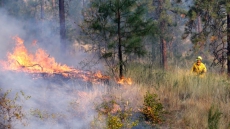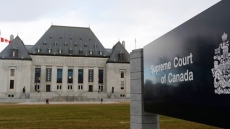VANCOUVER — A former Liberal environment minister is urging Prime Minister Justin Trudeau's cabinet to reject the Trans Mountain pipeline expansion, arguing there is no economic basis for the project.
David Anderson, who served 10 years in the cabinets of prime ministers Jean Chretien and Paul Martin, sent letters to six members of Trudeau's cabinet this week asking them to dismiss the pipeline proposal.
"There is no credible evidence to suggest that Asia is likely to be a reliable or a significant market for Alberta bitumen," Anderson wrote in the letter dated June 11.
Cabinet is expected to announce its decision on the expansion of the Alberta-to-B.C. pipeline by Tuesday. Given that Trudeau's government bought the pipeline and expansion project for $4.5 billion, it's widely anticipated to give it the green light.
Anderson holds a law degree and served eight of his 10 years in cabinet as the senior federal minister for British Columbia. While he was environment minister in 2002, Canada ratified the Kyoto Protocol on Climate Change. He is now an honorary director of West Coast Environmental Law and has previously spoken out against the Trans Mountain project.
His letter doesn't focus on the climate and environmental impacts of the expansion. Instead, he took aim at the economic argument for the project, which he described as the "perceived need for a pipeline connection with tidewater in order to sell Alberta bitumen in Asian markets, where, so it is claimed, it would find new purchasers."
"With respect, you and other government ministers have yet to provide evidence in support of that hope," he wrote.
Anderson wrote that Asian refineries have better supply options than Alberta. Compared with conventional light and medium crude oil from Nigeria and the Middle East, Alberta bitumen is expensive to produce, hard to handle and provides no security of supply advantages, he said.
Further, he said despite access to tidewater through unused pipeline capacity in the existing system and through American Gulf of Mexico ports, Alberta's bitumen has not found or developed any significant offshore market in Asia or anywhere else.
"Why? Because buyers are few and far between. That remains the situation today, and there is little to suggest it will change in the future. Building a new pipeline will not change the market."
Canada's two major competitors are Venezuela and Mexico and they've faced the same low demand and low prices that have eroded the value of Alberta bitumen, he added.
Anderson said in an interview that he sent the letter because he is a Liberal and felt the government needed to be reminded that it had not made a business case for the project. He said no one had responded.
"You'd think the people who own the pipeline, the Canadian taxpayers, should be informed of what their asset is likely to bring in," he said.
Trans Mountain Corp. has said the expansion will inject $7.4 billion into Canada's economy, boost federal and provincial tax coffers by $46.7 billion and increase revenues for producers by $73.5 billion over 20 years.
Trevor Tombe, an associate economics professor at the University of Calgary, said it's true that Alberta bitumen is more difficult to refine but that's reflected in the cheaper price.
Producers in Alberta are confident there will be demand and have made contractual commitments to ship through the expanded pipeline, he said. Further, he said all forecasts, including the National Energy Board's assessment, predict increased oil production in the province.
"The only question around the economics of the pipeline that matters is will there be barrels shipped in it, not where those barrels go. That will potentially even change from one year to the next," he said, adding the United States and British Columbia are other possible markets.
An often-cited argument for the expansion is that Alberta's prices are lower because it can only currently access U.S. markets. But Tombe argued the issue isn't that America is exercising market power, it's that Alberta is using high-cost transportation options including rail and truck.
"It is cheaper to ship by pipe than by rail. Full stop," Tombe said.
The largest single demand source for heavy crude remains the United States, but the fastest-growing market is Asia, said Kevin Birn, a North America crude oil market analyst at IHS Markit.
People sometimes refer to Asia as code for China, but the continent is an immense market containing India, Japan, Korea and others and it's looking for a variety of crude, both in terms of quality and geographic source, he said.
Refineries can be reconfigured to process different oil types but it's hard to justify doing so for Alberta crude if they can't get it on a consistent basis, he added.
"In the absence of having meaningful export capacity, there is no market for Canadian crude. But if there is meaningful export capacity, there is a market for Canadian crude."



